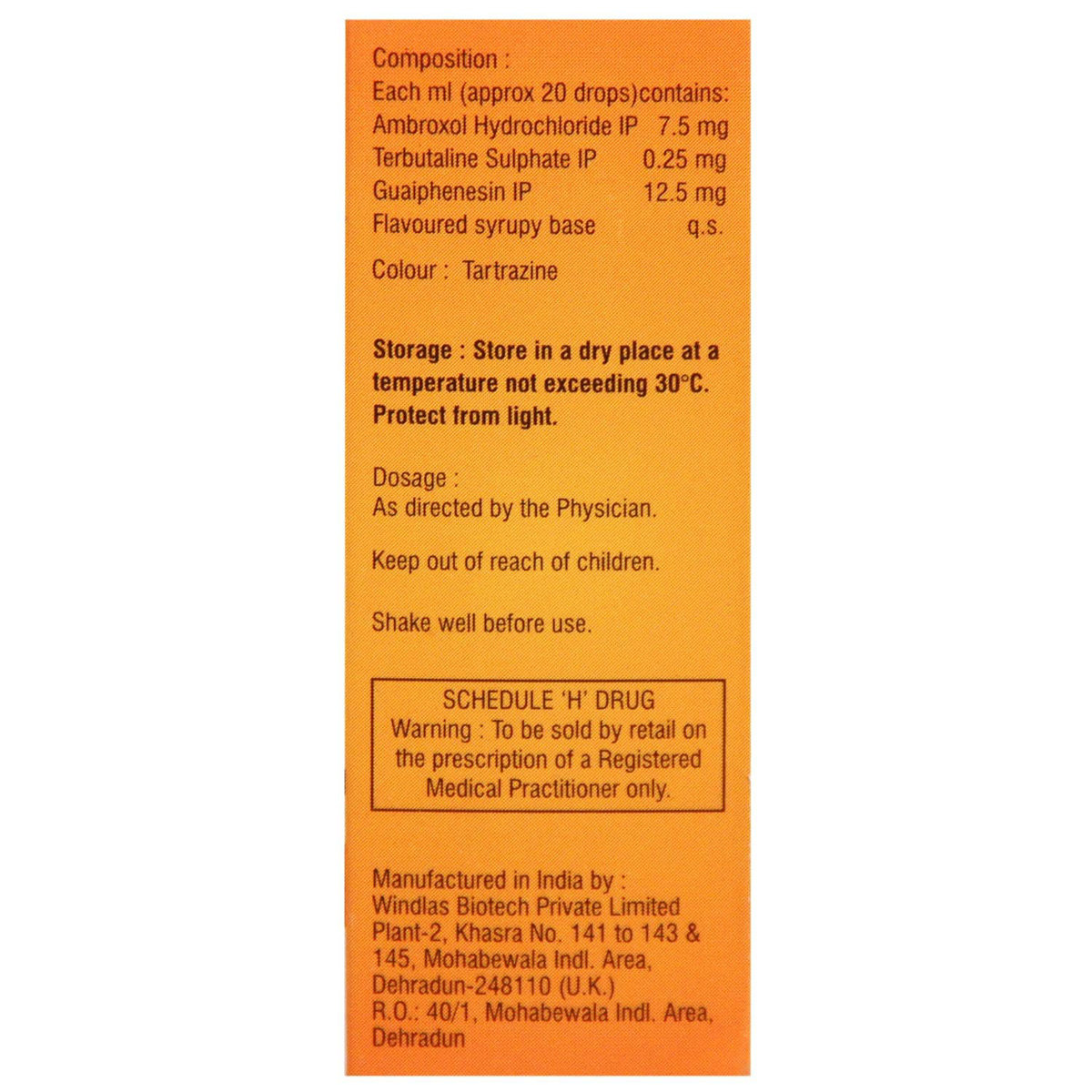- Home
- Meddryl Oral Drops
Meddryl Oral Drops Substitute
Meddryl Oral Drops Substitute
Medicine Composition:
AMBROXOL-7.5MG+GUAIFENESIN-12.5MG+TERBUTALINE-0.25MGAll Substitutes & Brand Comparisons
RX
Out of StockPosthma-X Oral Drops
₹42
(₹2.52/ 1ml)
127% COSTLIERRX
Out of StockRoxsin-TR Oral Drops
Cure Tech Skincare
₹44
(₹2.64/ 1ml)
137% COSTLIERRX
Out of StockMedkuff-XT Oral Drops
₹45
(₹2.7/ 1ml)
143% COSTLIERRX
Out of StockNempect B Oral Drops
Nemi Pharmaceuticals
₹45
(₹2.7/ 1ml)
143% COSTLIERRX
Out of StockMuco Soft Oral Drops
₹48
(₹2.88/ 1ml)
159% COSTLIERRX
Out of StockAedicof Oral Drops
₹49
(₹2.94/ 1ml)
164% COSTLIERRX
Out of StockGemicof Oral Drops
Vatican Life Sciences Pvt Ltd
₹49
(₹2.94/ 1ml)
164% COSTLIERRX
Out of StockJoecof Oral Drops
₹49
(₹2.94/ 1ml)
164% COSTLIERRX
Out of StockMucarylls drops 15ml
Glenmark Pharmaceuticals Ltd
₹58
(₹3.48/ 1ml)
213% COSTLIERRX
Out of StockCufiset AM Oral Drops Strawberry
Fibovil Pharmaceuticals Pvt Ltd
₹64
(₹3.84/ 1ml)
245% COSTLIERRX
Out of StockCufise AM Oral Drops
Fibovil Pharmaceuticals Pvt Ltd
₹64
(₹3.84/ 1ml)
245% COSTLIERRX
Rinocof TR Oral Drops 15 ml
Astrum Healthcare Pvt Ltd
₹65.5
(₹4.37/ 1ml)
293% COSTLIERRX
Asthakind P Drops 15 ml
Mankind Pharma Pvt Ltd
₹77
(₹4.62/ 1ml)
316% COSTLIERRX
Out of StockCoughwar Drops 15 ml
Bio Warriors Pharmaceucticals Pvt Ltd
₹72
(₹4.8/ 1ml)
332% COSTLIERRX
Out of StockAlkof Paediatric Oral Drops 15 ml
Alkem Laboratories Ltd
₹72
(₹4.8/ 1ml)
332% COSTLIER

When Should You Consider Switching from Meddryl Oral Drops?
Patients may explore substitutes in the following scenarios:
- High monthly cost of Meddryl Oral Drops
- Non-availability in local pharmacies
- Generic recommendation by a doctor
- Side effects or better tolerability with alternatives
What to Know Before Switching
Before you switch from Meddryl Oral Drops to another medicine, here are some important points to keep in mind:
Same salt, different brands:
Most substitutes contain the same active ingredient - AMBROXOL-7.5MG+GUAIFENESIN-12.5MG+TERBUTALINE-0.25MG, but the fillers, coating, or manufacturing quality may vary slightly.
Consult your doctor first:
Even if the salt is the same, your doctor can confirm if the substitute is right for your condition, dosage, and health history.
Watch out for allergies or reactions:
Some people may react differently to certain brands due to inactive ingredients. If you notice any side effects, inform your doctor immediately.
Price ≠ effectiveness:
A lower-priced substitute doesn't mean it's less effective. Many generic medicines work just as well as branded ones.
Check the dosage form and strength:
Always match the substitute’s strength (e.g., 5mg, 10mg) and form (tablet, capsule, syrup) with what your doctor prescribed.
Uses
Meddryl Oral Drops is used to treat a chesty cough. The detailed uses of Meddryl Oral Drops are as follows:
- Cough Relief: Meddryl Oral Drops treats productive coughs and provides relief from respiratory congestion.
- Mucolytic Action: Meddryl Oral Drops breaks down and thins mucus, making it easier to cough up, which helps relieve respiratory congestion.
- Bronchial Distress: Meddryl Oral Drops can relieve bronchial distress by reducing inflammation and clearing mucus, benefiting conditions like bronchitis.
- Support for Respiratory Conditions: Meddryl Oral Drops supports treatment for chronic respiratory conditions like asthma and COPD by improving airflow and reducing airway obstruction.
Medicinal Benefits
Meddryl Oral Drops is a combination of three drugs, namely: Ambroxol, Guaifenesin, and Terbutaline. Ambroxol belongs to the class of mucolytic agents (cough/sputum thinner) that work by thinning and loosening phlegm (mucus) in the lungs, windpipe, and nose for coughing out easily. Guaifenesin belongs to the class of expectorants that increase the volume of fluid in the airways, reduce the stickiness of mucus, and remove it from the airways. Terbutaline is a bronchodilator that relaxes muscles and widens the airways. Thus, it makes breathing easier.
FAQs
The substitutes of Meddryl Oral Drops contain the same active salt(s) - AMBROXOL-7.5MG+GUAIFENESIN-12.5MG+TERBUTALINE-0.25MG. However, they may differ in price, manufacturing quality, and inactive ingredients. Speak to your doctor to find a suitable option.
Switching to a generic substitute medicine in the place of Meddryl Oral Drops is often possible if it has the same salt, strength, and dosage form. But always check with your doctor before making any changes to your medication.
Generics versions of Meddryl Oral Drops are typically more affordable because they don’t include the original brand's research, development, and marketing costs. They contain the same active ingredient and are approved for safety and effectiveness.
Most people don’t notice any difference. However, some may react to different fillers or coatings. If you notice any unusual symptoms after switching, consult your doctor.
Make sure the new medicine has the same active salt, strength, dosage form. Always confirm the change with your doctor or pharmacist.
Substitutes of Meddryl Oral Drops meet the same safety and efficacy standards as Meddryl Oral Drops, but small differences in absorption or formulation can exist. A doctor can help you choose the right one for your needs.
Yes. Substitutes of Meddryl Oral Drops may vary in color, size, or shape due to differences in manufacturing and branding, but this does not affect how they work.
Yes, it’s generally safe to switch between multiple substitutes of Meddryl Oral Drops if they have the same salt and strength. However, always inform your doctor so they can monitor how your body responds.
Yes, many people safely use substitutes of Meddryl Oral Drops for long-term treatment. Just ensure it’s done under medical supervision.
If your symptoms stay under control or lab results remain stable, the substitute for Meddryl Oral Drops is likely working well. Regular follow-ups with your doctor are important.
Absolutely. Even with the same salt, small differences can affect how your body responds when switching from Meddryl Oral Drops to its substitute. Always consult your doctor before switching.
Meddryl Oral Drops belongs to the class of medicines called expectorants used to treat cough associated with mucus.
Meddryl Oral Drops contains Ambroxol, Guaifenesin and Terbutaline. Ambroxol is a mucolytic agent (cough/sputum thinner) that thins and loosens phlegm (mucus) in the lungs, helping to cough out easily. Guaifenesin is an expectorant that increases the volume of fluid in the airways, reduces the stickiness of mucus, and helps to remove it from the airways. Terbutaline is a bronchodilator that relaxes muscles and widens the airways, making breathing easier.
Meddryl Oral Drops should be used with caution in hyperthyroid (overactive thyroid) patients as it may worsen the condition. Inform your doctor if you have hyperthyroidism before taking Meddryl Oral Drops so that the dose may be adjusted appropriately. However, regular monitoring of thyroid hormone levels is recommended while taking Meddryl Oral Drops.
Yes, Meddryl Oral Drops may cause drowsiness or dizziness. It is not necessary for everyone taking Meddryl Oral Drops to experience this side effect. Therefore, avoid driving if you feel drowsy or dizzy after taking Meddryl Oral Drops.
Meddryl Oral Drops should be used with caution in diabetic patients if prescribed by a doctor. However, regular monitoring of blood sugar levels is recommended while taking Meddryl Oral Drops as it may increase blood sugar levels.
You are recommended to take Meddryl Oral Drops for as long as your doctor has prescribed it. However, if the symptoms persist or worsen, such as rash, fever, or persistent headache, after one week of using Meddryl Oral Drops, please consult your doctor.
No, you are not recommended to stop taking Meddryl Oral Drops without consulting your doctor, as it may worsen your cough or cause recurring symptoms. Therefore, take Meddryl Oral Drops for as long as your doctor has prescribed it, and if you experience any difficulty while taking Meddryl Oral Drops, please consult your doctor.
No, Meddryl Oral Drops is not an antibiotic. It is a combination medication that belongs to the class of medications called expectorants primarily used to treat cough associated with mucus.
The side effects of Meddryl Oral Drops include skin rash, nausea, vomiting, headache, dizziness, drowsiness, nervousness, tremors, stomach upset, and fast heartbeats. Most of these side effects of Meddryl Oral Drops do not require medical attention and gradually resolve over time. However, if these side effects persist or worsen, please consult your doctor.
Yes, Meddryl Oral Drops is considered safe for children when prescribed by a doctor. However, caution is advised, as it may not be suitable for all children. Therefore, always follow the doctor's recommended dosage and avoid self-medication to ensure safety and effectiveness for your children.
Meddryl Oral Drops is specifically used to treat coughs associated with mucus production. Therefore, it is not usually recommended for dry coughs, which do not involve mucus. Other medications may be more appropriate for dry coughs. Therefore, you must consult a doctor to determine the most suitable treatment for your symptoms.
Meddryl Oral Drops should not be used if you have certain medical conditions, take specific medications, or are allergic to any of its components. This is because Meddryl Oral Drops may interact with other medications, worsen certain conditions, or cause allergic reactions. Consulting a doctor before using Meddryl Oral Drops helps ensure safe usage and minimizes potential risks.
Taking Meddryl Oral Drops higher than the recommended dose will not be more effective. Instead, it may cause an overdose and increase the risk of serious side effects. Therefore, always take Meddryl Oral Drops in prescribed doses to treat your condition effectively.
Meddryl Oral Drops should be stored in a cool, dry place away from sunlight. Keep it out of sight and reach of children.
No, Meddryl Oral Drops is not an antibiotic. It is a combination medication that belongs to the expectorant class, and it is primarily used to treat coughs associated with mucus.
The common side effects of Meddryl Oral Drops include skin rash, nausea, vomiting, headache, dizziness, drowsiness, nervousness, tremors, stomach upset, and fast heartbeats. Most of these side effects of Meddryl Oral Drops do not require medical attention and gradually resolve over time. However, if these side effects persist or worsen, please consult your doctor.




